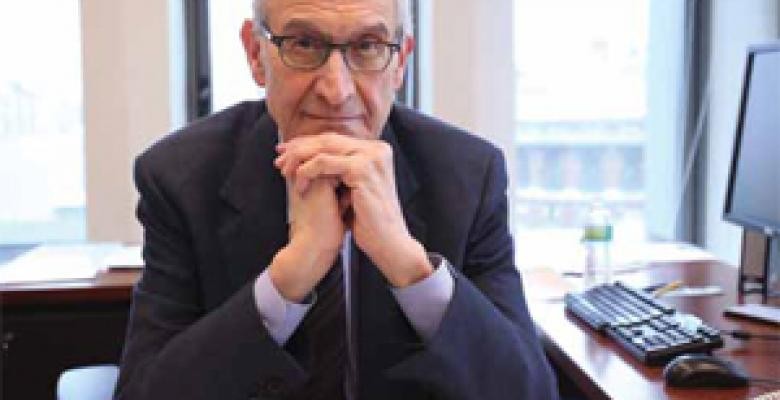Former Solicitor General Returns to Law School to Teach Contracts

When Charles Fried was a student at Columbia Law School in the late 1950s, he took three classes with Herbert Wechsler, a legendary constitutional law professor whose achievements included developing the legal framework for the Nuremberg trials and helping design a model penal code that updated and standardized criminal laws throughout the U.S.
“He was my model as a law teacher ever since,” said Fried (Law’60), who became something of a legend himself as a Harvard law professor, U.S. solicitor general under President Ronald Reagan and an associate justice on the Supreme Judicial Court of Massachusetts. “He had a luminescent intelligence, quickness of mind and wit, and a biting personality.” Wouldn’t some students have been afraid of such a larger-than-life figure? “Not me,” grinned Fried.
Fried is on a leave of absence from Harvard, where he has taught constitutional law and contracts law for decades. This semester he is back in Morningside Heights as the Stephen and Barbara Friedman Visiting Professor of Law, teaching contract law to 36 first-year students. “They’re such good students,” he said in an interview at the Columbia Law School, where his corner office denotes his stature and the virtually empty bookshelves suggest the temporary nature of his appointment.
It’s his second go-round as a visiting professor here, having been the Nathaniel Fensterstock Visiting Professor of Law four years ago, which involved giving several public lectures and attending faculty seminars.
As solicitor general during Reagan’s second term, Fried was a regular before the Supreme Court, and could sometimes—but by no means always—anticipate some of the questions from the bench. In one case he was arguing on behalf of the government to uphold a conviction when Justice Antonin Scalia asked him whether, if another defendant had done something similar in a different circumstance, that would be illegal too. “I answered, ‘I’m sure it wouldn’t be, your honor, but I can’t tell you why.’” The court upheld the conviction.
He didn’t always win before the court, of course. Fried still grimaces at the result of a 1988 case challenging the constitutionality of the special prosecutor law. “I lost that one 7-1,” he grumbles, the lone dissenter being Scalia. “Arguing before Scalia was usually fun and a challenge,” Fried said. He was usually on Fried’s side in those days, but not so the now-retired Justice John Paul Stevens. “He was wonderfully sharp and very courtly,” Fried said. “Stevens would say, Do you mind if I ask you this question?’ and the question would be just devastating.”
He returned to Harvard after Reagan’s term ended, teaching constitutional law and taking cases as well. Fried represented Merrell Dow Pharmaceuticals Inc. in a case about whether one of its drugs had caused birth defects. The rules of evidence did not then have a specific standard for expert witnesses, so when the case went before Supreme Court in 1993, it was Fried who argued for one. The resulting decision provided that federal judges must admit only relevant and reliable evidence. “We got a gatekeeping function for a trial judge,” said Fried. “I think that was the most important case I ever argued.”
Despite his senior role in the Reagan Administration, Fried has taken some positions in recent years that cannot be politically pigeonholed. He and his son, a philosophy professor, in 2010 published the book "Because It Is Wrong: Torture, Privacy and Presidential Power in the Age of Terror." The following year, he testified on Capitol Hill in favor of the Affordable Care Act in 2011, and this year he voted for Obama.
Fried teaches many of the cases in which he participated to his students, such as whether property damage in Hurricane Katrina stemmed from the storm itself or from the ensuing flood, which was specifically excluded from homeowners’ insurance policies. Fried, representing an insurance company, argued that it was a flood, and courts agreed.
One of his biggest cases was to determine whether the attack on the World Trade Center complex was one occurrence or two. The multi-billion-dollar distinction would decide whether the WTC’s leaseholder could recover the $3.5 billion in insurance coverage or double that amount because there were two towers. Fried, representing one of the 22 insurers, was among those making oral arguments before a federal appeals court that the attacks were a single occurrence. The Second Circuit Appeals Court in New York agreed with him. “That was a huge decision,” he said.